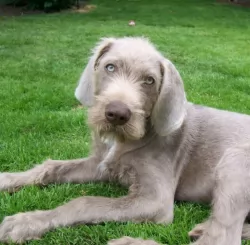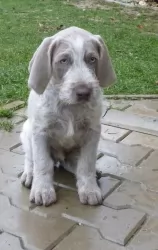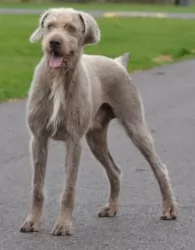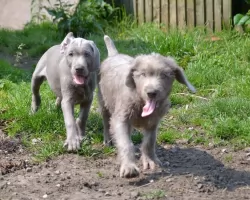 MyDogBreeds
MyDogBreeds Slovakian Rough Haired Pointer is originated from Slovakia but Siberian Husky is originated from Russia. Slovakian Rough Haired Pointer may grow 8 cm / 4 inches higher than Siberian Husky. Slovakian Rough Haired Pointer may weigh 8 kg / 18 pounds more than Siberian Husky. Both Slovakian Rough Haired Pointer and Siberian Husky has almost same life span. Both Slovakian Rough Haired Pointer and Siberian Husky has almost same litter size. Slovakian Rough Haired Pointer requires Low maintenance. But Siberian Husky requires Moderate maintenance
Slovakian Rough Haired Pointer is originated from Slovakia but Siberian Husky is originated from Russia. Slovakian Rough Haired Pointer may grow 8 cm / 4 inches higher than Siberian Husky. Slovakian Rough Haired Pointer may weigh 8 kg / 18 pounds more than Siberian Husky. Both Slovakian Rough Haired Pointer and Siberian Husky has almost same life span. Both Slovakian Rough Haired Pointer and Siberian Husky has almost same litter size. Slovakian Rough Haired Pointer requires Low maintenance. But Siberian Husky requires Moderate maintenance
 The Slovakian Rough Haired Pointer is a gundog from Slovakia. The dog came about by crossing the Cesky Fousek, German Wirehaired Pointers and Weimaraners. Other names for this dog include Slovensky Hrubosrsky Stavac.
The Slovakian Rough Haired Pointer is a gundog from Slovakia. The dog came about by crossing the Cesky Fousek, German Wirehaired Pointers and Weimaraners. Other names for this dog include Slovensky Hrubosrsky Stavac.
Developers were looking for a dog with good stamina – a dog capable of tracking hares and birds. The dog was first introduced into the United Kingdom in 1997.
 Siberian Huskies are very close to Chukchi people.Chukchi is a tribe in Siberian nomads and huskies are beleived to be originated with them. DNA tests on huskies prove that they are the oldest among the dog breeds and they used them to travel fast. Also children used to sleep with them as they provide body heat to them. Siberian Huskies also like to be very close to the children. In 1908 at the gold rush, huskies were imported to Alaska and used as sled dogs. In Alaska they were used for dog sled race until today.
Siberian Huskies are very close to Chukchi people.Chukchi is a tribe in Siberian nomads and huskies are beleived to be originated with them. DNA tests on huskies prove that they are the oldest among the dog breeds and they used them to travel fast. Also children used to sleep with them as they provide body heat to them. Siberian Huskies also like to be very close to the children. In 1908 at the gold rush, huskies were imported to Alaska and used as sled dogs. In Alaska they were used for dog sled race until today.
Siberian Huskies were exported from Siberia and they continued their journey in North America. American kennel club recognized them in 1930 and the Siberian club of america has been founded in 1938.
 The Slovakian Rough Haired Pointer has got some looks from each of the dogs he was derived from. He is a fairly large dog and the coat is short to medium length and harsh and wiry and he has some additional hair around the face area.
The Slovakian Rough Haired Pointer has got some looks from each of the dogs he was derived from. He is a fairly large dog and the coat is short to medium length and harsh and wiry and he has some additional hair around the face area.
Most times the coat is a grey-brown shade. The ears are medium length and floppy and the tail is mostly docked at 50% of natural length, although these days it is often left long. It is carried downwards when at rest but raised when in action.
This is an energetic dog that is going to need a lot of exercise, so he won’t suit living with people who aren't active. He just loves to be outside and will thrive on a farm.
He is good with children and other dogs, but training and socialization should be provided for this dog. He is intelligent and will learn easily.
They’re affectionate dogs and their social nature makes them ideal for lively families. Because he is so active he is best suited for living in the suburbs or the countryside as opposed to living on a small property in the city.
 Siberian Huskies are said to be one of the beautiful dog breeds in the world. They are well known for their thick coat and blue coloured eyes. Siberian Huskies are really challenging for new dog owners. It is preferred to give them a fenced yard and the fence should be sunk well to the ground to prevent them from escaping, as they always try to escape. They are medium sized working dogs having high energy level. Initially huskies were developed as sled dogs.
Siberian Huskies are said to be one of the beautiful dog breeds in the world. They are well known for their thick coat and blue coloured eyes. Siberian Huskies are really challenging for new dog owners. It is preferred to give them a fenced yard and the fence should be sunk well to the ground to prevent them from escaping, as they always try to escape. They are medium sized working dogs having high energy level. Initially huskies were developed as sled dogs.
They are affectionate and intelligent breed. Also they are independent in nature. They are kid friendly dogs and also are friendly with everyone including strangers. Siberian Huskies will be a good companion when given proper training and care. They are low shedders but it depends on the climate it lives. Normally they dont shed in cold climate but in warmer climate they will do. They shed heavily twice in a year for a three week strech. Normally Siberian Huskies do not suit well for apartment living. They are not watchdogs as they will bark very rarely but it enjoys to howl.
 People who have owned these dogs rave about their loyalty and affection. They’re also intelligent and become very well behaved as they are dogs that also want to please their owners.
People who have owned these dogs rave about their loyalty and affection. They’re also intelligent and become very well behaved as they are dogs that also want to please their owners.
They’re gentle dogs too, just wanting to be loved by their human family and craving attention.
They’re also regarded as low maintenance pets and all these positive aspects of this dog make him a splendid choice if you're looking for a wonderful pet and companion
 Siberian Huskies are very much affectionate with children. But it is necessary to train both parties to behave with each other. It is recommended to have an adult supervision for younger children.
Siberian Huskies are very much affectionate with children. But it is necessary to train both parties to behave with each other. It is recommended to have an adult supervision for younger children.
They are very good diggers and so they should be watched if they are in garden. They tolerate well in cold weather and mostly huskies can be seen in the area of snow falling. They are very good in pulling sledges.
They adapt well in cold weather. It is advised to give them a well fenced yard. They do not like apartment living. Also they do not like to be alone and if kept alone for long time they will disturb your house and make it dirty.
 Your Slovakian Rough Haired Pointer can reach 14 or 15 years of age if he is looked after well but hip dysplasia is a threat for any dog.
Your Slovakian Rough Haired Pointer can reach 14 or 15 years of age if he is looked after well but hip dysplasia is a threat for any dog.
Any aged dog can be affected and this mobility disease is caused when the hip joint develops abnormally. Although hip dysplasia is genetic, environmental factors can also play a part. The idea is to get treatment from the vet so that your canine friend isn’t in pain.
This can cause so many problems in the body and not just the teeth. Have your dog’s teeth checked regularly and have them cleaned.
Your dog can have neck or back pain from this ailment, occurring when the discs and vertebrae of the spine become infected. Provide your dog with healthy food to ensure a strong immune system to fight off diseases like this.
 Siberian husky suffers with minor health problems such as hypothyroidism, Progressive retinal atrophy and cataract. They are also prone to lose pigment in nose and muzzle. Some health problems occur due to bad breeding practices and some due to environmental problems where the puppy is brought up. They have also chances to get skin disease such as allergies.
Siberian husky suffers with minor health problems such as hypothyroidism, Progressive retinal atrophy and cataract. They are also prone to lose pigment in nose and muzzle. Some health problems occur due to bad breeding practices and some due to environmental problems where the puppy is brought up. They have also chances to get skin disease such as allergies.
When they are in the age of 2 to 5 years, they are having chances to hairloss due to Alopecia X. This condition mainly causes due to hair clipping in Siberians. They will be healthy but the hair will not grow in affected areas. Siberians are double coated and when the situation prevails the topcoat will fall off first and the undercoat follows it. The hair will fall off in both side of the dog in same area. Spaying or neutering will reduce such problems as it causes because of sex hormones.
 In one method of feeding the Husky puppies, the food will be given always available, but this method is not recommended as it has some problems. This method is followed by large breeders because of lack of time to spend on individuals. Another method is to keep meal for 3 times a day. At about 12 to 16 weeks of age the meals can be reduced to two times a day. In this method the meal given should not be there after 15 minutes even if puppy did not ate. The important training for Husky puppies while eating is they should not growl when the food is taken by its master.
In one method of feeding the Husky puppies, the food will be given always available, but this method is not recommended as it has some problems. This method is followed by large breeders because of lack of time to spend on individuals. Another method is to keep meal for 3 times a day. At about 12 to 16 weeks of age the meals can be reduced to two times a day. In this method the meal given should not be there after 15 minutes even if puppy did not ate. The important training for Husky puppies while eating is they should not growl when the food is taken by its master.
Many Siberian experts don't like commercial dog food as they are sure that because of such foods dog may get problems like itching, dandruff, loose stools and hot spots. According to experts the good food for them are home cooked food from turkey, real chicken, beef and fish. Fruits and fresh vegetables are also very good for them. It is advised by dog owners to add only low salt or even without salt in their food. Also sugar is not good for them as it will bring some problems like hairfall and itching.
Siberian huskies can be easily groomed. Their eyes should be checked in puppyhood as they get chances to get eye problems and hereditary eye diseases. It is advised to make siberians to bath once in a year and they must be brushed once in a week. While brushing, the ears should be inspected and its teeth should be brushed. It is good to trim the long hairs in their feet and also nails should be trimmed slightly and very carefully as they have blood vessels there.
To give training and exercises to Siberian Huskies, the home should be prepared for them and it is better to make a fenced yard to prevent escapes. They have very high chances to escape and so the fence should be minimum 6 feet high and base should be strong as it should not break it or dig under to escape. Since they are active from their puppyhood they must be given lots of exercise. They should be socialized in their early stages as to get good behaviour and manners.